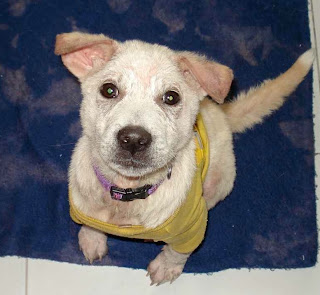Putu, my driver, who is also my landlord’s son-in-law, regales me with his tales of Balinese customs and rituals. Cats, he says, are revered here. If you run one over with your motorbike or car, you must stop, conduct a ceremony, end the cat’s suffering and dispose of the body in a respectful manner. When he struck a dog once, on the other hand, his only concern was the damage it might have caused his scooter.
I know not all Balinese think as Putu does. Clearly he’s relating his own perspective and his words incense me. From my many conversations with Putu I’ve discovered two key aspects of his personality: (1) he’s very superstitious; and (2) he fancies himself a playboy.
After he tells me a story about buying dog meat in a local market, I begin spinning my own tales of American beliefs. Dog, I explain, is God spelled backwards. The dog, I insist, is God’s favorite creature. I tell Putu in the U.S. we believe if you cause a dog suffering or see a dog in pain and fail to help, your penis will stop working. You will never, I emphasize, be able to have sex again.
Putu laughs nervously, glances from me to the road ahead of him, back and forth, several times, to see if I’m kidding. To add credibility to my story, I say the curse of the dog takes effect on your 29th birthday. Putu is 28.
“Poor Putu,” I say, shaking my head, my voice tinged with pity. “Mistreating dogs…bad karma.”
***
Good Karma is the name of the Vet Clinic run by Bali (Dog) Adoption & Rehabilitation Centre (BARC). If you spend any time in Ubud, you’re bound to run across the Bali Dogs bumper stickers and T-shirts at least once. If you spend time in Ubud and you happen to love—or even like—dogs, you may want to consider donating time or money to Good Karma. You can also create good karma from afar. For a small monthly donation, you can sponsor a dog.
I spent the day today playing with puppies. I showed up at Good Karma ostensibly as the volunteer receptionist. It’s not exactly a taxing job. Two families from Australia popped in to make donations. Their three beautiful children spent a good hour snuggling puppies, trying to convince their mothers there had to be a way to take some of them home with them.
A couple from the U.S. also came by to make a donation and buy T-shirts and postcards. Upon seeing what my job entails they decided to volunteer as well. “It’s a good gig,” I said. “But I’m not sure it qualifies as volunteer ‘work.’ It’s more like volunteer play.”
The two newest additions to Good Karma, young pups, perhaps five weeks old, were scared and feral and huddled together in a cage when I arrived at 9 a.m. By the time I left at 5, they were running around the clinic, allowing us to pet them gingerly for a few moments and roughhousing with the older puppies.
Lee, a small white pup, that would be wearing designer dog couture if he lived in the States was found tossed in a trash heap, his body in a rice bag which was tied tightly around his neck. He’d been the victim of an at-home castration and infection had spread throughout his entire body. He couldn’t walk when he first arrived, but he was willing to eat. So despite the odds, the staff of Good Karma—Linda and Ebony—decided to treat him rather than euthanize. Today he toddled around the Good Karma clinic, snuggled up for belly rubs. That’s how forgiving dogs are.
Today at Good Karma, two animals arrived for treatment. One, a cat, was brought in by a beautifully dressed Western woman who did not have an appointment. Her cat received immediate attention, treatment and was sent home with medicine. The bill for those services—25,000 rupiahs, which is about $3 U.S. When I suggested she might want to make a donation in addition to paying her bill, she huffed at me, and when I handed her the receipt for 25,000 rupiah, she threw it back at me. She was unwilling to kick in more than $3 for an emergency vet visit, treatment and medicine. In the States, she would have paid at least $100.
The second patient was a shih-tzu, a breed of dog that holds a special place in my heart. Her owner, a local Balinese man, had first brought the dog, Lucky, to a different clinic. But Lucky’s cough had not improved. Unfortunately, the vet tech was not able to treat Lucky and since the vet was out sick, Lucky will have to return tomorrow.
I’ll be returning to Good Karma tomorrow too. It’s unbearable to hear the stories of how the dogs and puppies ended up in the clinic needing treatment. It’s hard to see innocent animals, baby animals, suffering. But, I truly believe turning a blind eye is bad karma.
It can be difficult to muster sympathy for the adult Bali street dogs. They can seem menacing when walking the Ubud streets alone at night and several of them surround you, barking. I personally believe that most dogs want nothing more than to have their own human companion. For most of the dogs in Bali, that will never be an option.
Even when well-intentioned Westerners adopt the dogs, giving them great homes, there’s often no happy ending for the Bali dog. Many Westerners inevitably end up returning to their own countries and leaving their well-cared for dogs behind to fend for themselves. Once a dog is domesticated it can’t survive on the streets.
I think educating Balinese on the joys of dog companionship and how to treat a dog humanely might be the best way to solve the homeless dog problem.
A lot of Westerners see the street dogs wearing collars and assume those dogs have owners. But the colors are attached by BARC. After rounding up dogs for spaying and neutering, the dogs are given collars to distinguish them from the dogs who still need to be fixed.
Around the world, animals are suffering. In the U.S. the suffering is largely hidden, the atrocities of the food industry are rarely witnessed. In Bali, the suffering is right out in the open: roosters, kept in cages too small to turn around in, used for cockfighting, emaciated goats and cows tethered in the sun on short ropes, birds of all kinds imprisoned in tiny cages. If you can help even one animal suffer less, that, I believe, is good karma.








